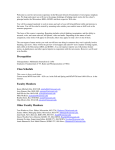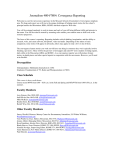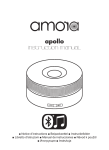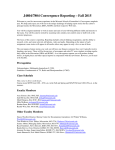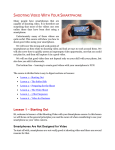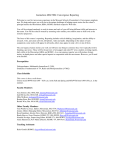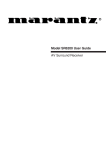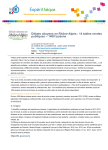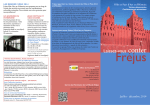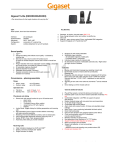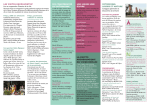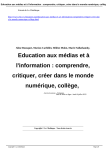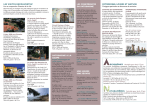Download 4804/7804 – Convergence Reporting (Spring 2013) Prerequisites
Transcript
4804/7804 – Convergence Reporting (Spring 2013) Welcome to your first newsroom experience in the Missouri School of Journalism’s Convergence emphasis area. We hope and expect you will rise to the unique challenge of helping report stories for the school’s principal media: the Missourian, KBIA, KOMU and their respective Web sites. You will be assigned randomly to work in teams and each of you will bring different skills and interests to the teams. You will be asked to stretch by assuming roles outside your comfort zone or skill level as the semester progresses. The focus of this course is reporting. Reporting includes critical thinking, imagination, and the ability to research, write, and create artwork, still photos, video and audio. Depending on the nature of each assignment, some stories will appear in all media, others may appear in only a few or one of them. The convergence feature stories you work on will have one thing in common: they won’t typically involve breaking, spot news. Those will be the purview of newspaper and radio/TV news students working regular, daily shifts at the Missourian, KBIA and KOMU. As a convergence reporter you will produce feature stories, in-depth pieces and other special reports in cooperation with the newsrooms. However, you’ll need to be flexible. Prerequisites Undergraduates: Multimedia Journalism (J-2150) Graduates: Fundamentals of TV, Radio and Photojournalism (J-7802) Class Schedule This course is three credit hours. Course meets MWF from 8:00 – 8:50 a.m. Faculty Members Karen Mitchell, Rm. 001C RJI, [email protected] Amy Simons, Rm. 001E, RJI, [email protected] Mike McKean, [email protected] Reuben Stern, Rm. 001B RJI, [email protected] Olga Missiri, Rm. 001A RJI, [email protected] Other Faculty Members Tom Warhover, Exec. Editor, Missourian, 882-5734, [email protected] Jeanne Abbott, Managing Editor, Missourian, 882-5741 [email protected] Janet Saidi, News Director, KBIA-FM, 882-3431, [email protected] Stacey Woelfel, News Director, KOMU-TV, 884-NEWS, [email protected] Jeimmie Nevalga, Supervising Editor, KOMU-TV, 884-NEWS, [email protected] Recommended Texts The Elements of Journalism - by Bill Kovach & Tom Rosenstiel Journalism Next - by Mark Briggs The Investigative Reporter’s Handbook, 4th Edition - by Brant Houston, Len Bruzzese and Steve Weinberg Recommended Viewing The Last Lecture – Achieving Your Childhood Dreams – Randy Pausch Shift Happens – 4.0 Check the course schedule often. Links to occasional online readings will appear there. You are expected to keep up with news from the print, online and on-air services of the Missourian, KOMU, KBIA and their local competitors. Class discussions will sometimes focus on that coverage. Policies, Procedures and Grading Code of Ethics The role of a journalist is to tell the truth, act independently and minimize harm. As such, journalism students are expected to read and comply with with the highest ethical standards. Though various codes have slight differences – you will find they are all based in the same values. Please review the codes for the following news organizations: Society of Professional Journalists, Radio, Television, Digital News Association and National Press Photographers Association. As a convergence student, you are held to a strict standard of being able to adapt to different newsroom environments and learning the policies of that work environment. If you ever have a question about an ethical standard, get in touch with your faculty editor as soon as possible. SPJ Code of Ethics RTDNA Code of Ethics NPPA Code of Ethics Academic Honesty Academic honesty is fundamental to the activities and principles of a university. All members of the academic community must be confident that each person’s work has been responsibly and honorably acquired, developed and presented. Any effort to gain an advantage not given to all students is dishonest whether or not the effort is successful. Academic misconduct includes but is not limited to the following: Use of materials from another author without citation or attribution. Use of verbatim materials from another author without citation or attribution. Extensive use of materials from past assignments without permission of your instructor. Extensive use of materials from assignments in other classes without permission of your instructor. Fabricating information in news or feature stories, whether for publication or not. Fabricating sources in news or feature stories, whether for publication or not. Fabricating quotes in news or feature stories, whether for publication or not. Lack of full disclosure or permission from editors when controversial reportorial techniques, such as going undercover to get news, are used. Classroom Misconduct When in doubt about plagiarism, paraphrasing, quoting or collaboration, consult with your instructor. For closed-book exams and exercises, academic misconduct includes conferring with other class members, copying or reading someone else’s test and using notes and materials without prior permission of the instructor. For open-book exams and exercises, academic misconduct includes copying or reading someone else’s work. Classroom misconduct includes forgery of class attendance; obstruction or disruption of teaching, including late arrival or early departure; failure to turn off cellular telephones leading to disruption of teaching; playing games or surfing the Internet on laptop computers unless instructed to do so; physical abuse or safety threats; theft; property damage; disruptive, lewd or obscene conduct; abuse of computer time; repeated failure to attend class when attendance is required; and repeated failure to participate or respond in class when class participation is required. IMPORTANT: Entering a classroom late or leaving a classroom before the end of the period can be extremely disruptive behavior. Students are asked to arrive for class on time and to avoid early departures. This is particularly true of large lectures, where late arrivals and early departures can be most disruptive. Instructors have the right to deny students access to the classroom if they arrive late and have the right to dismiss a student from the class for early departures that result in disruptions. Under MU policy, your instructor has the right to ask for your removal from the course for misconduct, disruptive behavior or excessive absences. The instructor then has the right to issue a grade of withdraw, withdraw failing or F. The instructor alone is responsible for assigning the grade in such circumstances. A Special Note about Web Access in Class The above language regarding classroom misconduct stems from discussions between MU Faculty Council and the Provost’s Office. While Convergence Journalism faculty endorse the intent expressed above, we also tolerate (and actively encourage in many instances) personal web access during class time. Attention to and mastery of content discussed during class is your responsibility. We will alert you if there are specific times during a lecture, training session or class discussion when we intend to limit or prohibit webs access. Dishonesty and Misconduct Reporting Procedures MU faculty are required to report all instances of academic or classroom misconduct to the appropriate campus officials. Allegations of classroom misconduct will be forwarded immediately to MU’s Vice Chancellor for Student Services. Allegations of academic misconduct will be forwarded immediately to MU’s Office of the Provost. In cases of academic misconduct, the student will receive at least a zero for the assignment in question. Professional Standards and Ethics The School of Journalism is committed to the highest standards of academic and professional ethics and expects its students to adhere to those standards. Students should be familiar with the Code of Ethics of the Society of Professional Journalists and adhere to its restrictions. Students are expected to observe strict honesty in academic programs and as representatives of school-related media. Should any student be guilty of plagiarism, falsification, misrepresentation or other forms of dishonesty in any assigned work, that student may be subject to a failing grade from the instructor and such disciplinary action as may be necessary under University regulations. Audio and Video Recordings of Classes Students may make audio or video recordings of course activity for personal use and review unless specifically prohibited by the faculty member in charge of the class. However, to foster a safe learning environment in which various viewpoints are respected, the redistribution of audio or video recordings or transcripts thereof is prohibited without the written permission of the faculty member in charge of the class and the permission of all students who are recorded. (Collected Rules and Regulations, University of Missouri, Sect. 200.015, Academic Inquiry, Course Discussion and Privacy) University of Missouri Notice of Notifications The University of Missouri System is an Equal Opportunity/ Affirmative Action institution and is nondiscriminatory relative to race, religion, color, national origin, sex, sexual orientation, age, disability or status as a Vietnam-era veteran. Any person having inquiries concerning the University of MissouriColumbia’s compliance with implementing Title VI of the Civil Rights Act of 1964, Title IX of the Education Amendments of 1972, Section 504 of the Rehabilitation Act of 1973, the Americans With Disabilities Act of 1990, or other civil rights laws should contact the Assistant Vice Chancellor, Human Resource Services, University of Missouri-Columbia, 130 Heinkel Building, Columbia, Mo. 65211, (573) 882-4256, or the Assistant Secretary for Civil Rights, U.S. Department of Education. Accommodations If you have special needs as addressed by the Americans with Disabilities Act and need assistance, please notify us immediately. The school will make reasonable efforts to accommodate your special needs. Students are excused for recognized religious holidays. Please let me know in advance if you have a conflict. ADA Compliance If you have special needs as addressed by the Americans with Disabilities Act (ADA) and need assistance, please notify the Office of Disability Services, A038 Brady Commons, 882-4696, or the course instructor immediately. Reasonable efforts will be made to accommodate your special needs. Religious Holidays Students are automatically excused for recognized religious holidays. Let your instructor know in advance if you have a conflict. Intellectual Pluralism The University community welcomes intellectual diversity and respects student rights. Students who have questions concerning the quality of instruction in this class may address concerns to either the Departmental Chair or Divisional leader or Director of the Office of Students Rights and Responsibilities (http://osrr.missouri.edu/). All students will have the opportunity to submit an anonymous evaluation of the instructor(s) at the end of the course. 4804/7804 Course Assignments and Grading Effective fall 2011 – Both graduate and undergraduate students enrolled in this class are subject to plus/minus grading.Your grade will reflect these percentages: Style Quizzes – 10% There will be five style/grammar quizzes during the semester, administered through the University’s Blackboard site. For the first four you will have 15 minutes to answer 10 questions. The last quiz will be 30 minutes long for 15 points. All the quizzes use the AP and Missourian stylebooks (open book.) If you have a problem accessing a style quiz or a computer issue, you must contact an instructor immediately or the quiz score will stand as incomplete. Newsroom Shifts – 20% Newsroom shifts are graded based on the quality of your finished story files, self-evaluations in finished story files and feedback from newsroom editors. You are responsible for creating your folders and writing a summary of your newsroom shift in the classes folder. Be sure to include a link and/or copies of final articles/scripts/slideshows/mp3’s or movies in your folder as well. Folder structure: classes<4804 Convergence Team Story Assignments – 55% Story grades are based on the following criteria: Deadline performance Professionalism (e.g. problem-solving, teamwork and attitude) Journalism quality – Reporting, writing, storytelling Innovation Technical quality – Audio quality, video quality, use of tripod, etc. AP Style for written work and photo captions Peer Evalutions – 5% Much of the work in convergence journalism courses is team-based. One complaint about teams is that some people will take advantage of stronger teammates and allow themselves to “coast” without putting forth their own best effort. To create more effective teams this semester, you will grade and be graded by your classmates on each of your team stories. A form will be provided that you’ll be expected to fill out and submit after each team story. Class participation and Attendance – 10% Class participation and attendance are vital and can rarely be made up. Classes are designed to supplement your hands-on learning, introduce new ideas and bring up big picture topics that may or may not be relevant to your reporting during any one week. If you need help with operating cameras, software or advice on stories, faculty and staff are happy to provide additional instruction in the Futures Lab. We will take attendance at every class. You may miss four classes (three in the summer sessions) for any reason without penalty. We will not judge absences as excused or unexcused. Please check with a classmate to find out what happened in class when you were gone. If you still have questions about the material, check in with an instructor. After four (three) absences, each additional absence will result in a lower letter grade for attendance. If you have a chronic issue or illness that causes you to miss class for more than a week — please see an instructor. *** There will not be a mid-term or final in this class. Undergrads are assigned grades on the plus/minus scale. Grad students are assigned plus/minus grades through C-. No D grade may be awarded a graduate student, and a grade of F means the work has not satisfied the minimum requirements of the course. Deadlines are listed in the syllabus, though they may be altered occasionally after consultation between convergence faculty and editors at the Missourian, KBIA and KOMU. If we discover after publication/broadcast that you were responsible for a significant fact error in a story, your grade for that story will be dropped by one letter. Plagiarizing any portion of a story will result in a failing grade for the course. Please feel free to meet with us at any time to discuss grades or any other issue. Part of professionalism is seeking advice when needed to handle special concerns or problems or to propose new ideas or innovations. Stories turned in after the 5pm deadline will be docked at least one letter grade. Failure to complete an assignment or your part of an assignment may lead to a failing grade in the course. Extra credit opportunities: Blogging: If you create a blog and add at least (one post a week during summer 2011) ten weekly posts to the blog during the semester, you can increase your final grade by 5 points. (For example, a B plus, becomes an A minus.) Where you see assignments due each week, there is a reminder to blog. We will discuss options for your blog in class. Mike McKean’s Search Tools exercise: Though you’ve been using the World Wide Web most of your college careers — there are many ways the Web can be used strategically by reporters. After a class lecture on search tools, Mike McKean offers an Internet search exercise. If you successfully complete the search with a grade of 80% or higher, you’ll get 5 points added to your end of semester Style Quiz grade. Graduate Student Assignment Grad students will perform a concise meta-analysis of their shift work and the stories created by their reporting teams. Shift work is loosely defined depending on which of the newsrooms you’ve chosen for this semester. The analysis may be presented as a paper (text), a blog (text plus multimedia) or as a portfolio website. The analysis should focus on the journalistic quality of the stories you’ve editing, produced or coached along as well as what the experiences have taught you about the strengths and weaknesses of multimedia reporting and producing in an era of changing delivery methods. (eg: mobile, online, social networks, microblogging, traditional platforms) The analysis should be approximately the equivalent of 4-5 written pages. Websites should contain multiple tabs and should reflect professionalism and your career path. You MAY use content created from other classes to include in your portfolio. You MAY use templates and CSS stylesheets from the Internet. You MAY incorporate your class blog into a tab on the portfolio site. The graduate component is due by Friday, December 14, 2012 and should be turned in via email to [email protected] as a link or word doc. Writing Intensive Requirements All MU undergraduate students are required to complete an upper-division writing intensive course in their major. Journalism 4804 satisfies that requirement for Convergence Journalism majors. All WI courses use writing as a tool for thinking and learning; all require revision as a way of improving critical thinking. Here’s how we’ll carry out those goals. • • • • News feature reporting projects/team stories: On weeks when you are working on a team story, you will write scripts, text stories, photo captions, information graphics, etc. These news stories will take on extensive revisions as you work with student project managers and faculty editors leading up to deadline. Team stories will be followed by a one-page written evaluation of your teammates’ performance on your project. Written bi-weekly newsrooms update: Each week you work in a newsroom, you will submit brief written report describing the story you covered, multimedia content you produced and any issues may have arisen on your shift. We may occasionally refer to these updates in class discussion. In-class presentation: There is one informal in-class presentation in which you and a partner(s) will demonstrate a new tech tool and evaluate it’s potential uses for journalists. Blogging: We expect you to write/produce content regularly for your own blog. If you already have one, just send Mike the link. If you need to create one, there are a variety of tools. Blogger.com, Weebly.com and WordPress.com are good options. You may also send me your Twitter address if you’d like me to follow your tweets. (Optional) Work will be graded on the following plus/minus A-F scale. Your grade will be counted as the majority of the attendance portion of your grade in this class. You may not receive a passing grade for this class without completing this assignment. A+ 97-100 A 94-96 A 90-93 B+ 87-89 B 84-86 B- 80-83 C+ 77-79 C 74-76 C- 70-73 F 69 or lower Course Schedule Week 1 Mon. January 21 No class, Martin Luther King holiday Wed. January 23 (Amy) Introductions. Syllabus review. Getting started. Policies and procedures. How to connect to the classes server Newsroom shifts • • • • Three team story ideas are sent to faculty editors and project managers by Tuesday night at 7 p.m. Send email to [email protected] The subject line of the email should be: 4804 story pitches, Team Name/Number Fridays we meet at 8 a.m. in the Futures Lab to discuss your best ideas. Your team stories are due the following Thursday at 5 p.m. with all components of your story saved to the !FinishedStories section of the classes server in the folder for each person in the group. (Each student’s folder must contain every element of your story, text, photos, video, captions, mp3’s, PDF’s, etc.) Fri. January 24 (Amy & Karen) Recording video using a Nikon D7000, equipment overview, lab policies Link to download the Nikon D7000 user manual (PDF) Help file: Setting up the D7000 for shooting video Lab procedures/policies Week 2 **Special note: KBIA is holding on-site orientation at 9:30a and 1:30p on Tuesday, Wednesday and Thursday. Everyone is required to attend one session** Mon. January 28 (Amy) How to write and turn in your story pitches STYLE QUIZ 1: Available on Blackboard from 9am Monday until 5pm Wednesday Story pitch form Checklist for completing team stories Finding good story ideas Stories we don’t want to see again (pdf) Six questions journalists should be able to answer before pitching a story 6 Ways Journalists Can Use Press Releases Effectively How to get an A on my next team story Snoopy Team Story Assignments Team 1: Heather Adams, Brooke Burchill Team 2: Colin Duft, Sarah Harkins Team 3: Nikki Hindman, Alexandra Menz Team 4: Michael Losch, Jill Ortiz Team 5: Annie Trout, Rickelle Pimentel Team story ideas due by 7 p.m. Tuesday for Snoopy teams Wed. January 30 (Amy) KOMU, Newsy newsroom orientation Matheny Map KOMU Shift Checklist/Workflow (pdf) Newsroom dress codes Thu. February 1 Faculty will be around the Futures Lab to assist with story idea development, one-on-one gear questions Fri. February 2 Snoopy teams’ weekly pitch meeting with faculty and project managers in the Futures Lab Week 3 Mon. February 4 (Karen) Using the Marantz, KBIA scripting, using nat sound. Assembling a Basic Audio Story in Adobe Audition Complete Marantz Manual Instructions for working at KBIA KBIA Guide to Scripting (pdf) Abbreviated KBIA guide to a wrap or package (pdf) 10 Commandments of Getting Good Natural Sound Setting up and using a wireless microphone KBIA Beat Sheet KBIA Work Examples Jessica Naudziunas – Peanut Butter Prices Rising Kyle Stokes – Big Storm Kyle Stokes – “C” is for Cuts Jessica Naudziunas – Cattle Rustling Jacob Fenston – Six Months After the Storm KGOU Budget Storm on the Horizon Woodstock Team Story Assignments Team 1: Brittany Crocker, Jacob Hamilton Team 2: Batul Hassan, Ashleigh Jackson Team 3: Chris Long, Maria Martinez Team 4: Kathryn Mersmann, Rebekah Rigby Team 5: Joseph McLean, Rachel Gleason Team story ideas due by 7 p.m. on Tuesday for Woodstock teams Wed. February 6 (Karen) DSLR Video, Part Deux Link to download the Nikon D7000 user manual (PDF) Help file: Setting up the D7000 for shooting video Thu. February 7 Snoopy team stories due at 5 p.m. Fri. February 8 Woodstock weekly pitch meeting with faculty and project managers in the Futures Lab Week 4 Mon. February 11 (Amy) Intermediate Blogging STYLE QUIZ 2: Available on Blackboard from 9am Monday until 5pm Wednesday Why Journalists Must Blog & How How To Create Your Own Blog How To Build An Audience Giving Your Blog A Visual Edge Adam Westbrook: Five Mistakes I Wish I Hadn’t Made Interact With Your Niche To Find New Readers A Guide to Happy (and Legal) Tumblr-ing 20 Great Blogs By Journalists Extra credit: Earn an additional half a letter grade on your final semester grade by blogging once weekly until the end of the semester. Must have 11 posts to earn the extra credit. Posts must be live on your sites by 5 p.m. on Saturdays to earn the credit for that week. Snoopy Team Story Assignments Team 1: Heather Adams, Alexandra Menz Team 2: Brooke Burchill, Michael Losch Team 3: Colin Duft, Jill Orntiz Team 4: Sarah Harkins, Annie Trout Team 5: Nikki Hindman, Rickelle Pimentel Story ideas due to faculty and project managers by 7 p.m. Tuesday. Wed. February 13 (Amy) In-class critique How to get an A on my next team story Thu. February 14 Woodstock team stories due to 5 p.m. Fri. February 15 Story pitches for Snoopy teams. Meet in RJI Futures Lab. Week 5 Mon. February 18 (Mike McKean) Mike McKean’s search tools for the Internet Mike McKean’s Search Tools Web Scavenger Hunt Woodstock Team Story Assignments Team 1: Brittany Crocker, Joseph McLean Team 2: Jacob Hamilton, Rebekah Rigby Team 3: Batul Hassan, Kathryn Mersmann Team 4: Ashleigh Jackson, Christopher Long Team 5: Maria Martinez, Rachel Gleason Story ideas due to at 7 p.m. Tuesday. Wed. February 20 (Reuben Stern) Interviewing techniques Interviewing techniques The Art of the Interview, ESPN-style Tips for interviewing people with disabilities Interviewing crime victims Thu. February 21 Snoopy team stories due at 5 p.m. Fri. February 22 Story pitches for Woodstock teams in the RJI Futures Lab Week 6 Mon. Feb. 25 (Karen) Photo Refresher: The art of photography/photojournalism STYLE QUIZ 3: Available on Blackboard from 9am Monday until 5pm Wednesday Nikon: Understanding ISO sensitivity Mostly understandable explanation of exposure (aperture, shutter speed, ISO) Nikon: Composition Guidelines Five Basic Rules of Shot Composition Photography Quick Course Guide (PDF file) Examples of good detail photos SLR Camera Simulator Help files: Basic Nikon D7000 camera settings Each photo must have a caption – Caption help file Text should always conform to proper style – The five-minute stylebook Photoshop tutorial (from the Knight Digital Media Center) Link to Download the Nikon D7000 user manual (PDF download) Basic Nikon D7000 settings Nikon D70 manual (pdf) Nikon D80 manual (pdf) Snoopy Team Story Assignments Team 1: Heather Adams, Rickelle Pimentel Team 2: Brooke Burchill, Annie Trout Team 3: Colin Duft, Michael Losch Team 4: Sarah Harkins, Alexandra Menz Team 5: Nikki Hindman, Jill Ortiz Story ideas due via email by 7 p.m. Tuesday. Wed. February 27 (Lynda) Ten Commandments of Visual Storytelling STYLE QUIZ 4: Available on Blackboard from 9am Monday until 5pm Wednesday Best practices for visual storytelling Types of shots and sequences Visual grammar Your step by step guide to creating a traditional 1:30 TV/television package Examples of good detail shots Storyboard information Tips for producing effective audio slideshows Thu. February 28 Woodstock team stories due at 5 p.m. Fri. February 29 Story pitches for Snoopy teams in the RJI Futures Lab Week 7 Mon. March 4 (Amy) Writing Strong Intros & Nut Grafs The Nut Graf, Part I Nut Grafs, the Lynchpins of Clear Writing The Art of the Nut Graf: Don’t Just Get New Visitors, Keep Them Strong From the Start: Leads & Nut Grafs Woodstock Team Story Assignments Team 1: Ashleigh Jackson, Joseph McLean Team 2: Christopher Long, Rebekah Rigby Team 3: Maria Martinez, Kathryn Mersmann Team 4: Brittany Crocker, Jacob Hamilton Team 5: Batul Hassan, Rachel Gleason Story pitches due by 7 p.m. Tuesday. Wed. March 6 (Reuben Stern) Reporter’s Toolbox: What don’t you know? Thu. March 7 Snoopy team stories due at 5 p.m. Fri. March 8 Story pitches for Woodstock teams in the RJI Futures Lab Week 8 Mon. March 11 (Amy) Advising Day: What are the best ways to tailor your schedule to obtain the career of your dreams? Snoopy Team Story Assignments Team 1: Heather Adams, Sarah Harkins Team 2: Brooke Burchill, Nikki Hindman Team 3: Colin Duft, Alexandra Menz Team 4: Michael Losch, Rickelle Pimentel Team 5: Jill Ortiz, Annie Trout Story ideas due by 7 p.m. Tuesday. Wed. March 13 (Amy) In-class critique Thu. March 14 Woodstock team stories due at 5 p.m. Fri. March 15 Story pitches for Snoopy teams in the RJI Futures Lab Week 9 Mon. March 18 (Kevin Quealy) Kevin Quealy, member of the New York Times graphics department, shows off some of the department’s best work Snow Fall: The Avalanche at Tunnel Creek A Peek Into Netflix Queues Top World Cup Players on Facebook, Day by Day> Woodstock Team Story Assignments Team 1: Brittany Crocker, Christopher Long Team 2: Jacob Hamilton, Ashleigh Jackson Team 3: Kathryn Mersmann, Rebekah Rigby Team 4: Batul Hassan, Maria Martinez Team 5: Joseph McLean, Rachel Gleason Story pitches due at 7 p.m. Tuesday. Wed. March 20 (Reuben) Infographics 100 Incredible Infographic Tools & Resources Thu. March 21 Snoopy stories due at 5 p.m. Fri. March 22 Story pitches for Woodstock teams in the RJI Futures Lab Week 10 Spring Break — No classes, no newsroom shifts. If you’re blogging for extra credit, you must blog one weekend of the break in order to remain on track with the number of posts you need. Week 11 Mon. April 1 (Amy) In-class critique Snoopy Team Story Assignments Team 1: Jill Ortiz, Brooke Burchill Team 2: Annie Trout, Heather Adams Team 3: Michael Losch, Alexandra Menz Team 4: Sarah Harkins, Nikki Hindman Team 5: Colin Duft, Rickelle Pimentel Story pitches are due at 7 p.m. Tuesday Wed. April 3 (Charles Thomas) Charles Thomas, WLS-TV Political Reporter Charles Thomas, WLS-TV political reporter and Missouri School of Journalism graduate, joins us via Skype to talk about the challenges reporters face when many of their stories may be meeting-driving and all of their subjects have an agenda to push. Thu. April 4 Deadline for Woodstock teams at 5 p.m. Fri. April 5 Story pitches for Snoopy teams in the RJI Futures Lab Week 12 Mon. April 8 (Joy Mayer) Engaging with your audience Measuring Community Engagement: A Case Study from Chicago Public Media RJI: Community Engagement If investigative reporters don’t explain the impact of their work, who will? Joy Mayer’s Engagement page on Delicious Woodstock Team Story Assignments Team 1: Brittany Crocker, Maria Martinez Team 2: Batul Hassan, Joseph McLean Team 3: Ashleigh Jackson, Katy Mersmann Team 4: Jacob Hamilton, Christopher Long Team 5: Rebekah Rigby, Rachel Gleason Team story ideas due at 7 p.m. Tuesday Wed. April 10 (Mark Horvit) Investigative reporting Why investigative reporting matters and how to improve your stories using investigative tips/tools Investigative Reporters & Editors Thu. April 11 Snoopy team stories due at 5 p.m. Fri. April 12 Story pitches for Woodstock teams in the RJI Futures Lab Back to Top Week 13 Mon. April 15 (Amy) Ethics & Social Media RTDNA Social Media guidelines ASNE social media best practices AP Social Media Guidelines for Employees (pdf) Shmacked students partying online hurting job prospects Alica Stice: Remember that time Derrick Washington got mad at me on Twitter? Joy Mayer: Journalistic transparency in a red-state-blue-state world STYLE QUIZ 5/FINAL: Available on Blackboard from 9am Monday until 5pm Wednesday Snoopy Team Story Assignments Team 1: Rickelle Pimentel, Sarah Harkins Team 2: Annie Trout, Colin Duft Team 3: Jill Ortiz, Heather Adams Team 4: Michael Losch, Nikki Hindman Team 5: Brooke Burchill, Alexandra Menz Story ideas due at 7 p.m. Tuesday Wed. April 17 (Karen) Ethical Dilemmas in photojournalism Manipulating images and tricking news sources — does the end justify the means? News.com, “Pictures that lie,” Sept. 11, 2006 Thu. April 18: Woodstock stories due at 5 p.m. Fri. April 19 Story pitches for Snoopy teams in the RJI Futures Lab Week 14 Mon. April 22 (Mike McKean) Measuring Converged Audiences A primer on analytics, radio, print and television research tools. Audit Bureau of Circulation Arbitron — Radio Ratings Nielsen Media Reseach: TV ratings, web and mobile tracking Web Analytics Definitions — Measuring Web Audience (pdf) Google Analytics provides detailed web site statistics. View their video tutorial here. Adobe Digital Marketing Suite (including SiteCatalyst and Adobe Social) Chartbeat — real-time web traffic monitoring Do Not Track — Universal Web Tracking Opt Out Jim Edwards, Business Insider, “Microsoft’s ‘Do Not Track’ Plan Is In Tatters As Advertisers Vow to Ignore It,” October 10, 2012 Who’s linking to your site? Type the following in Google or Yahoo! or Bing: (link: newsy.com) Results of Fall 2004 KOMU.com Viewer Survey Eye tracking research: Dem0 1, Demo 2 Woodstock Team Story Assignments Team 1: Jacob Hamilton, Batul Hassan Team 2: Christopher Long, Joseph McLean Team 3: Maria Martinez, Rebekah Rigby Team 4: Brittany Crocker, Ashleigh Jackson Team 5: Kathryn Mersmann, Rachel Gleason Team story ideas due at 7 p.m. Tuesday Wed. April 24 (Lynda Kraxberger) Amy Webb’s Tech Trends Watch the ONA2012 session with Webb Media’s Amy Webb http://storify.com/krystina0610/10-tech-trends-of-2012 http://storify.com/juanmunozcnn/10techtrends-10-tech-trends-for-2012 Thu. April 25 No stories due today. Faculty will be in the Futures Lab to answer your questions. Fri. April 26 Story pitches for Woodstock teams in the RJI Futures Lab Week 15 Mon. April 29 (Terez Paylor) Working the sports beat For many news consumers, the sports section is a place to escape, but for journalists working the sports beat, it’s every bit as much news as politics, business and crime. Kansas City Star sports reporter Terez Paylor is our guest lecturer today, to talk to you about the challenges he faces in the field every day. Wed. May 1 (Lynda Kraxberger) Tech Trends II Students present their “findings” along with their buddies! Thu. May 2: Final deadline day for Snoopy teams Fri. May 3 No story pitches today – grading begins at 9am Week 16 Mon. May 6 Course wrap-up and evaluations Wed. May 8 WILD CARD!!! Thu. May 9 Final deadline day for Woodstock teams. Fri. May 10 Reading Day. No classes. Grading begins at 9am WEEK 17 – Finals week; no classes, no shifts.
















